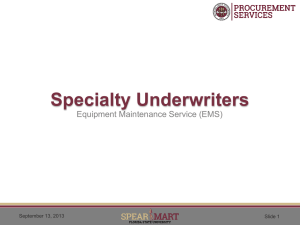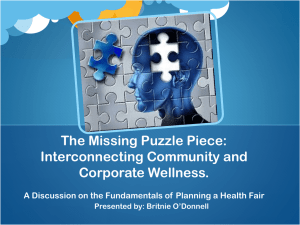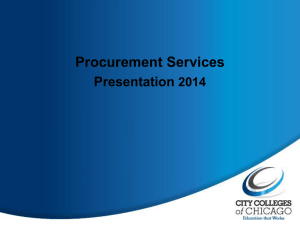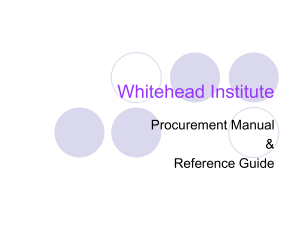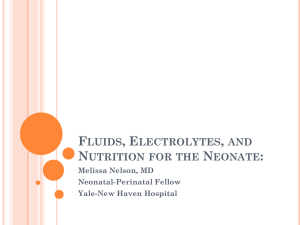FINAL LA Legislative Auditor Presentation to AGA March 12 2014
advertisement
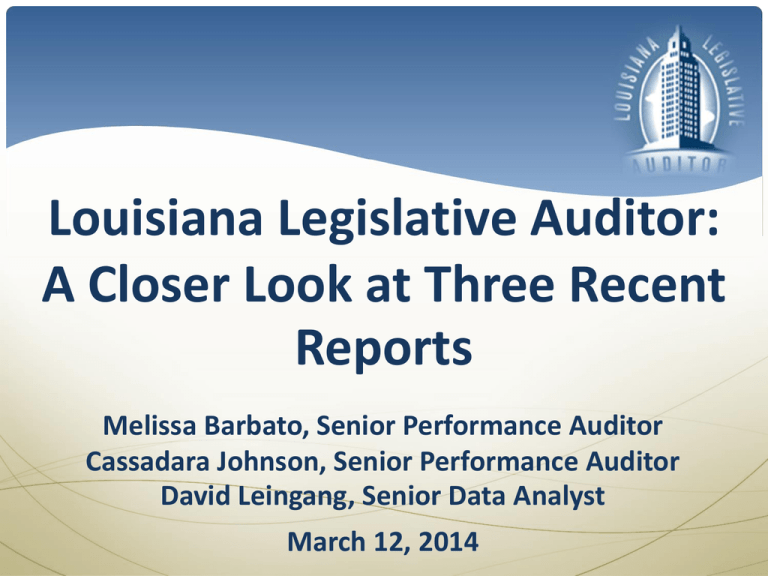
Louisiana Legislative Auditor: A Closer Look at Three Recent Reports Melissa Barbato, Senior Performance Auditor Cassadara Johnson, Senior Performance Auditor David Leingang, Senior Data Analyst March 12, 2014 • Special Supplemental Nutrition Program for Women, Infants and Children (WIC), Office of Public Health, Department of Health and Hospitals, November 2013 • Medicaid Participant Fees Paid for Deceased Individuals, Department of Health and Hospitals, October 2013 • Monitoring of Non-Secure Residential Contract Providers, Office of Juvenile Justice, January 2014 Special Supplemental Nutrition Program for Women, Infants and Children (WIC) Melissa Barbato, Senior Performance Auditor • Special Supplemental Nutrition Program for Women, Infants, and Children • Federal U.S. Department of Agriculture program • Louisiana’s $126 million program certified about 145,000 participants in FY12 • Pregnant women, breastfeeding women, postpartum women, infants, children up to age 5 • Must meet income requirements • Must be a Louisiana resident • Must have a nutrition-related problem • Nutrition education • Healthy foods, such as: – – – – – Milk Eggs Whole grain bread Fruits Vegetables • Food instruments • Redeemed at vendor locations • WIC vendors are authorized by OPH • 723 vendors across Louisiana in FY12 • Vendor types • OPH should strengthen its process for administering and monitoring vendors and clinics. • We will discuss four of the nine findings today. • OPH assigns vendors to groups, or tiers • Based on self-reported sales volume and location • Rural/small sales volume vendors can generally charge more than large urban vendors Tier Description 1 Urban Vendor & $200,000+ in sales 2 Rural Vendor & $30,000-$100,000 in sales 3 Rural Vendor & less than $30,000 in sales 4 Urban Vendor & less than $200,000 in sales 5 6 WIC Only Vendor Above 50% Vendor 7 Rural Vendor & $100,000+ in sales Source: Prepared by legislative auditor’s staff using WIC redemption data, January-June 2013 • Some vendors may have charged too much, while others may not have charged enough • Overall, vendors may have overcharged the program an estimated $655,132 Assigned Tier Correct Tier # Vendors Potential Overcharge / Undercharge 1 7 21 -$31,407.35 3 1 35 $176,329.73 7 1 144 $381,225.29 Source: Prepared by legislative auditor’s staff using WIC redemption data, January-June 2013. • We recommended that OPH develop a review process to ensure it assigns vendors to the correct tier. • OPH agreed. • Attempts to redeem food instruments over the maximum are rejected • Vendors are required to submit monthly price reports • OPH did not verify the accuracy of prices Vendor Total WIC food items priced Total accurate prices Total inaccurate prices – too high Vendor #1 44 33 11 Vendor #2 14 6 8 Vendor #3 20 12 8 Total 78 51 (65%) 27 (35%) Source: Prepared by legislative auditor’s staff using August 2013 price information. • We recommended that OPH modify its routine monitoring process to include verification of the vendor’s prices. • OPH agreed. • “High risk” vendors have a high probability of program abuse • Federal requirements • FY12 discrepancy: 24 or 5 high risk vendors? • No required FY12 activity documented for 2 of the 5 high risk vendors • Smaller vendors redeemed large numbers of transactions over time: – One vendor had over 38,000 paid transactions totaling approximately $873K in FY13 • Vendors with high numbers of “even dollar” transactions: Vendor (Top Five) # Even Dollar Transactions Total Amount Vendor #1 1,311 $32,944 Vendor #2 1,081 $7,721 Vendor #3 702 $23,183 Vendor #4 483 $14,740 Vendor #5 455 $17,214 4,032 $95,802 Total Source: Prepared by legislative auditor’s staff using redemption data and other OPH vendor data. • Vendors consistently redeemed at/near the maximum amount: % Maximum # Vendors 95 96 97 98 99 100 375 315 339 290 268 206 Source: Prepared by legislative auditor’s staff using data from Solutran. Amount $58,209.76 $56,214.95 $71,267.89 $66,729.82 $39,991.68 $48,471.25 • Vendors with high numbers of returned food instruments: Return Reason # Vendors Stale Dated Early Cashing Altered Unreasonable Dollar Amount (Above Max for Food Instrument) 153 465 427 $13,373.88 $117,480.66 $138,758.51 611 $724,155.81 Source: Prepared by legislative auditor’s staff using data from Solutran. Amount • We recommended the following to OPH: – Correctly report number of high risk vendors – Investigate high risk vendors as required – Adopt analyses similar to those presented in the report and other analyses as identified • OPH agreed. • Enforcement authority in several sources; however, these sources are inconsistent • FY12 enforcement actions: – Disqualified one vendor – Issued no penalties – Did not track warning letters sent • Counting WIC food inventory during routine monitoring • OPH sent 71 warning letters in the sample we reviewed • However, there were 90 total stock violations in our sample • Nine documented instances with no follow up • May/September 2013 observations • Complaint regarding expired infant formula • Warning letter -> 90 day disqualification or penalty • 6 of the 75 vendors in our sample had repeat violations but only received a warning letter • Informal/nonspecific correction action plans accepted • Some of our recommendations to OPH included: – – – – Ensure sanctions are consistent across sources Address unsanitary conditions Develop template for corrective action plans Develop sufficient tracking system to detect patterns/improve effectiveness • OPH agreed. Medicaid Participant Fees Paid for Deceased Individuals David Leingang, Senior Data Analyst • Data Analytics Unit • Project • • • • • • Who – Subunit of Performance Audit What – Analyze Data When – November 2012 Where – State Agencies Why – Do more with less, Proactive How – ACL and Excel • Bayou Health and Louisiana Behavioral Health Partnership • Eligibility Determination • Per member per month fees • To determine if DHH paid Medicaid participant fees for deceased individuals in the Louisiana Behavioral Health Partnership and Bayou Health programs between February 1, 2012, and June 30, 2013. • DHH – Medicaid –All payments made between 2/1/2012 and 6/30/2013 • DHH – Vital Records –Deceased data from 1991 • Compared the deceased individuals from Vital Records to the Medicaid claims paid to determine if any payments were made for claims occurring after a participant’s death Payment to Providers $1,200,000 $1,000,000 $800,000 Payments for Deceased Individuals $984,165 $796,305 $600,000 $400,000 $200,000 $69,004 $Before February 1, Between February 1, 2012 2012 and March 31, 2013 Date of Death After March 31, 2013 Number of Participants 900 800 700 600 500 400 300 200 100 0 Before February 1, 2012 Between February 1, 2012 and March 31, 2013 Date of Death After March 31, 2013 Breakdown of Payments by Entity $700,000 $600,000 $598,965 $500,000 $527,341 $400,000 $441,216 $300,000 $257,963 $200,000 $100,000 $15,625 $8,364 UnitedHealthcare of Louisiana Community Health Solutions of America $LaCare Louisiana Healthcare Amerigroup Louisiana Connections Bayou Health Magellan Health Services Louisiana Behavioral Health Partnership • DHH does not have a sufficient process in place for identifying deceased Medicaid participants in a timely manner • According to DHH management, the department should be able to recover the payments identified in this report. Office of Juvenile Justice (OJJ): Monitoring of Non-Secure Residential Contract Providers Cassadara Johnson, Senior Performance Auditor Objective: To determine if OJJ has improved its monitoring of non-secure residential contract providers since our 2010 performance audit. • We followed up on 14 recommendations related to monitoring of contract providers. Status of OJJ Recommendations As of June 30, 2013 Number of Recommendations Percentage Implemented 8 58% Partially Implemented 3 21% Did Not Implement 3 21% Total 14 100% Recommendation Status Source: Prepared by legislative auditor’s staff using information obtained from OJJ. • OJJ had 12 non-secure residential contracts totaling over $42.9 million. • Contract terms are approximately two to four years, with the oldest contract beginning September 2011. • La.R.S. 15:1084 requires OJJ to use a formula to determine the rates for non-secure residential contracts. • Rates paid to contract providers ranged from $112.65 per day to $258.62 per day for similar services. • Recommendation: Establish a formula to establish rates for non-secure residential facilities as required by law. • No financial monitoring conducted to ensure that contract providers operate within their budgets. • No verification that invoiced amounts were spent on required services. • Recommendation: Develop a risk based approach for monitoring whether contract providers are operating within their budgets. • OJJ’s monitoring tools did not address all contract requirements. • Some examples include: – Substance Abuse Treatments – Psychiatric Consultation – Behavior Management – Education Assessments • OJJ had no comprehensive system to track monitoring results. – OJJ did not record any results from its monthly monitoring visits As a result, OJJ could not track deficiencies of contract providers over time and ensure that sanctions were consistently imposed. • OJJ did not ensure outcome data collected from contract providers was complete. – All annual outcome reports submitted by contract providers for fiscal year 2013 were incomplete. – Contract providers failed to report over 50% of the required outcome measures. However, OJJ did not review the outcome measures that contract providers did submit. Number of Outcome Measures Providers Failed to Report Fiscal Year 2013 Providers Boys Town of LA AMI Kids Community Receiving Home (Renaissance) Rutherford House Harmony Center- Harmony III Group Home Harmony Center- Camelia Group Home Johnny Robinson's Boys Home Christian Acres Youth Center, Inc. Educational & Treatment Council Allen's Consultation & Training Boys and Girls Villages Ware Youth Center Source: Prepared by legislative auditor's staff using provider annual reports. Number of Measures Providers Failed to Report (out of 24 Required Measures) 23 23 22 21 19 19 19 17 7 15 15 6 % 96% 96% 92% 88% 79% 79% 79% 71% 70% 63% 63% 55% • Recommendations: – Ensure monitoring tools address all contract requirements. – Develop a system to track monitoring results and use this data to manage the overall monitoring process. – Monitor the annual outcome reports submitted from all providers and use this information to evaluate the quality and effectiveness of services provided. • OJJ entered into a two-year, $12 million contract with Magellan to manage 5 of the 12 non-secure residential contracts. • OJJ had not developed a monitoring plan as required by this contract. • Recommendations: – Develop a plan to monitor Magellan’s oversight of the 5 contracts – Require Magellan to report on its progress towards meeting the specific goals of the contract Questions? For these reports (and others), visit www.lla.la.gov
